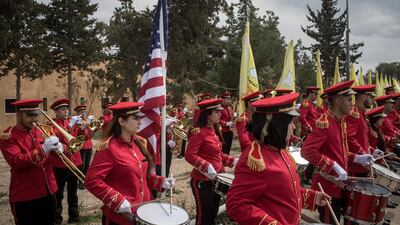The Syrian Democratic Forces' yellow flag hoisted over Baghouz is deeply symbolic, not only of the defeat of ISIS as it was driven out of its last stronghold, but also of the hope once again fostered among the 7.7 million people who once lived under the extremist group's oppressive rule. Since 2015, the Kurdish-led SDF has battled tirelessly against ISIS, losing some 11,000 fighters in the process. As the very last sliver of land controlled by the so-called caliphate fell, it marked the end of the group's reign of terror over Iraq and Syria. The long-awaited victory gives cause for celebration, but with a caveat – ISIS has not, as US President Donald Trump has claimed, been entirely eradicated.
The group thrives on ideology, not just territory, and that has not been beaten. According to the UN, there are up to 30,000 loyalists still in the area. As quickly as it has been beaten back, ISIS has been regrouping rapidly in Iraq and Syria and could start regaining territory within six to 12 months, if pressure on the militants is not maintained. Many of the group’s members, including the leader of the so-called caliphate, Abu Bakr Al Baghdadi, are still at large. SDF commander-in-chief, general Mazloum Kobani, warned that continued support was needed to prevent the extremist group making a comeback as Iraq and Syria try to rebuild. The SDF is struggling to control thousands of ISIS fighters in its jails in northern Syria. If the US follows through on its threat to withdraw troops from Syria, it will leave the Kurdish-led force painfully exposed.
More than 50,000 civilians poured out of Baghouz alone before its downfall, many of them ISIS families and diehard supporters who have now been subsumed in crowded refugee camps and will be hard to identify. This is a dangerous situation as they could reform, indoctrinate new recruits or launch violent attacks. Ideas are also more mutable than territories and can survive long after the defeat of their defenders. As British Foreign Secretary Jeremy Hunt said: "We cannot be complacent. Even without territory, [ISIS] and its poisonous ideology will continue to pose a threat to the people of Iraq and Syria, as well as to the wider world. The international community must remain firm in its determination to counter and defeat it."
There also remains the question of finding a political solution for the country. The Kurdish-led coalition has been crucial in the fight against ISIS, yet its future hangs in the balance with the threat of an assault from Turkey and few backers or protection if the US withdraws, other than the Russian-backed Syrian regime. Syria remains a quagmire of world powers, all acting in their own interests. Efforts must be made to find a political solution to rebuild the country while keeping ISIS's ideology at bay. Millions of Syrians, plunged into a humanitarian crisis after eight years of war, remain displaced or are living in refugee camps. After years of suffering, they must finally be given a chance to live in peace and security.

